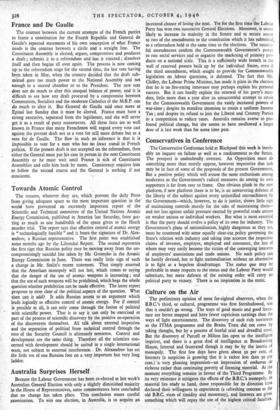Conservatives in Conference
The Conservative Conference held at Blackpool this week is inevit- ably an inquest on failure as well as a readjustment to the future. The prospect is undoubtedly overcast. An Opposition must do something more than merely oppose, however imperative that task may be in face of some of the proposals of the present Government, But a positive policy which will arouse the same enthusiasm among moderates as the Government's radical measures do among its own supporters is far from easy to frame. One obvious plank in the new platform, if new platform there is to be, is an unwavering defence of the liberty of the subject against every unjustified encroachment by the Government—which, however, to do it justice, shows little sign of maintaining controls merely for the sake of maintaining them— and not less against unfair pressure exerted by powerful trade unions on weaker unions or individual workers. But what is most essential is that the party should evolve a policy of its own for industry. The Government's plans of nationalisation, highly dangerous as they are, must be countered with some equally clear-cut policy governing the State's relation with industry and taking into account the respective claims of investor, employer, employed and consumer, the last of whom may very easily become the victim of the converging interests of employers' associations and trade unions. No such policy can be hastily devised, but to fight nationalisation without an alternative is to fight at a hopeless disadvantage. The status quo may be preferable in many respects to the status and the Labour Party would substitute, but mere defence of the existing order will carry no political party to victory. There is no inspiration in the static.






























 Previous page
Previous page